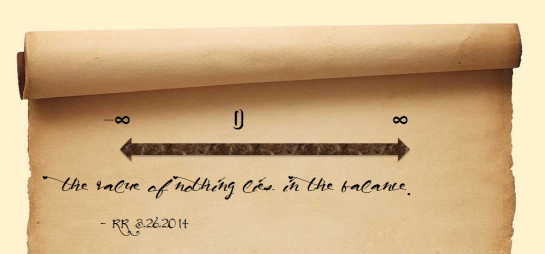
The value of nothing lies in the balance

The value of nothing lies in the balance
These should sound familiar to all of us.
l. I take up the Path of not killing. “Though the many beings are numberless, I vow to save them.” This is both universal and positive. The emphasis is upon protection, nurturing, and upon spiritual encouragement. Both are expressions of perfections: both enhance the process of perfection. 2. I take up the Path of not stealing. I will respect the order of things in harmony. The question is, which view kills? Which view gives life? 3. I take up the Path of not misusing sex. Sex is misused when it is an addiction rather than the peak experience of love between a committed couple. Addiction has been best defined globally as, “It is an addiction when we do someting repetitively that causes another to cry.” All such addictive behaviours, stealing, lying, using alcohol or drugs, slandering, even killing reveals a lack of confidence, a need for something from others. Everyone needs guidance to find a Path to forget the self. 4. I take up the Path of not speaking falsely. Speaking falsely is also killing. The lie is set up to defend the idea of a fixed entity, a self image, a concept, or an institution. “I want to be known as warm and compassionate”, so I deny that I was cruel, even though somebody got hurt. “Sometimes I must lie to protect someone or large numbers of people, animals, plants and things from getting hurt, or I believe I must”. What is the big picture? 5. I take up the Path of not using anything that clouds the mind. This is not absolute. A little wine may warm the bones and relaxes inhibitions, and casual conversation enhances humanity and the humanity of others. This is a warning against addiction and dependency. “Am I completely honest at the very source of my thoughts?” “What is my Everyday Path (see today’s Koan on Everyday Path)?” 6. I take up the Path of not discussing faults of others. This too deals with an aspect of killing. More people get hurt by gossip than by guns. The point is that nobody has a fixed character. Everyone has tendencies, and those tendencies can be used or misused, read or misread. The tendency to be accomodating can be seen negatively as passivity, and positively as patience. Encourage the tendency, and it will find its own path. 7. I take up the Path of not praising myself while abusing others. The reason some praise one’s self and abuse others is that they seek to justify and defend self as a certain kind of superior being. We are neither superior nor inferior. All actions and words are appropriate or inappropriate to the needs of people, animals, plants and things, including one’s self. If we are authoritarian and put self up and others down, then we cannot meet others need to grow and mature or our own to listen and learn. Harmony is obscured. The world suffers. 8. I take up the Path of appreciation of all phenomena in their precious uniqueness, the interdependence of everything in perfect harmony, and the absence of any abiding self. When we remain still, our conduct, the things we say enhance our own understanding of uniqueness, harmony and peace, and understanding on the part of others, so that our family members, friends and everyone and everything can maintain their path. 9. I take up the Path of not indulging in anger. We have all had the experience of bathing in anger. Something unreasonably tiny, perhaps something we don’t even notice, and we sit there playing out scenarios of retribution. Do you blame yourself for this condition? It is needless blame, and it only adds to the confusion. If you are sincere, you return to your path whenever you possibly can. Blake says, “the tygers of wrath are wiser than the horses of instruction.” Life does and will hurl a thunderbolt of anger from time to time. Indulgence in anger is the addiction, and it rests upon pain. Pain is inevitable. Suffeing is an option. l0. I take up the Path of not slandering the treasures of knowledge (realization), harmony (our everyday path to realization), and the fellowship of all living things. Slandering is belittling them, and the grossest kind of belittling is conceptual analysis that reduces and quantifies – obscuring the unknown and unknowable source, the marvellous subtlety, the synchronicity and symmetry of experience, and the precious nature and aspiration of each individual person, animal or plant.  -Restructured from The Second Paramita, Robert Aitken Roshi
-Restructured from The Second Paramita, Robert Aitken Roshi 